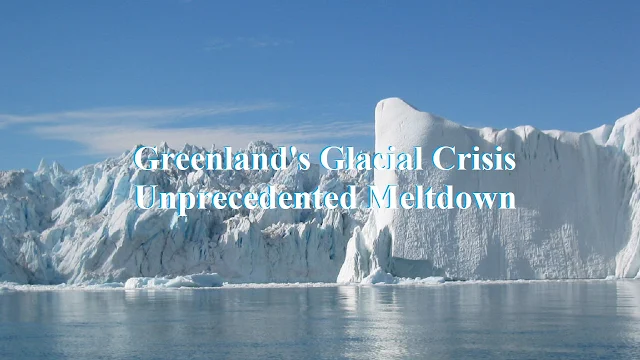Unveiling the Cold Reality: Greenland's Glaciers Melt at a Pacing Alarmingly Warmer Than the Arctic Chill – A Wake-Up Call for Climate Action!
In recent findings by scientists from the University of Copenhagen, Greenland's glaciers are undergoing a concerning acceleration in melting, surging five times faster than two decades ago. This alarming trend is directly linked to the impacts of global warming.
Explore the alarming revelation of Greenland's glaciers melting at an unprecedented rate, presenting a critical link between global warming and accelerated climate change. Delve into the scientific findings that highlight the urgent need for collective action to address the environmental challenges posed by this concerning phenomenon.
Unprecedented Melting Rate
The study, which focused on a thousand glaciers in Greenland (List of glaciers in Greenland), reveals a significant shift in the rate of melting over the last 20 years. Anders Anker Bjork, an assistant professor at the University of Copenhagen, emphasized the clear connection between rising global temperatures and the accelerated melting of glaciers.
Implications for Sea Level Rise
Greenland's ice sheet, holding a substantial volume of water, poses a potential threat to sea levels. Should the entire ice sheet melt away, it could result in a sea level rise of at least 20 feet (6 meters). This underscores the urgency of addressing climate change to mitigate the impacts on our planet.
Alarming Glacier Size Reduction
The study findings indicate a concerning annual reduction in glacier size, averaging 25 meters compared to 5-6 meters two decades ago. The data, collected over 130 years through satellite imagery and historical photos, paints a vivid picture of the acceleration in Greenland's glacial melting.
Global Warming's Role
With the planet experiencing a temperature increase of nearly 1.2°C above pre-industrial levels, scientists project that 2023 will likely be the warmest year in 125,000 years. Jørgen Eivind Olesen, Institute Director of the Climate Institute at Aarhus University, stresses the necessity of a global effort to reduce greenhouse gas emissions to counteract this concerning trend.
Ongoing Consequences
The ongoing acceleration in Greenland's glacial melting has broader implications for climate change. William Colgan, senior researcher at the Geological Survey of Denmark and Greenland (GEUS), points out that this rapid loss of glacier mass could indicate a future trajectory for the entire ice sheet.
Sea Level Rise Attribution
The Greenland ice sheet and glaciers are significant contributors to observed sea level rises. Between 2006 and 2018, the ice sheet contributed 17.3%, and glaciers contributed 21% to the observed increase. Greenland, home to around 22,000 glaciers, serves as a critical indicator of the broader impacts of climate change.
Climate change has become a big challenge that should be treated seriously! The accelerated melting of Greenland's glaciers underscores the pressing need for global action to combat climate change and its far-reaching consequences on our planet.


